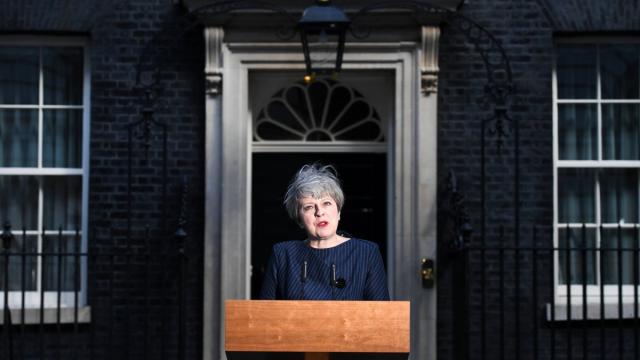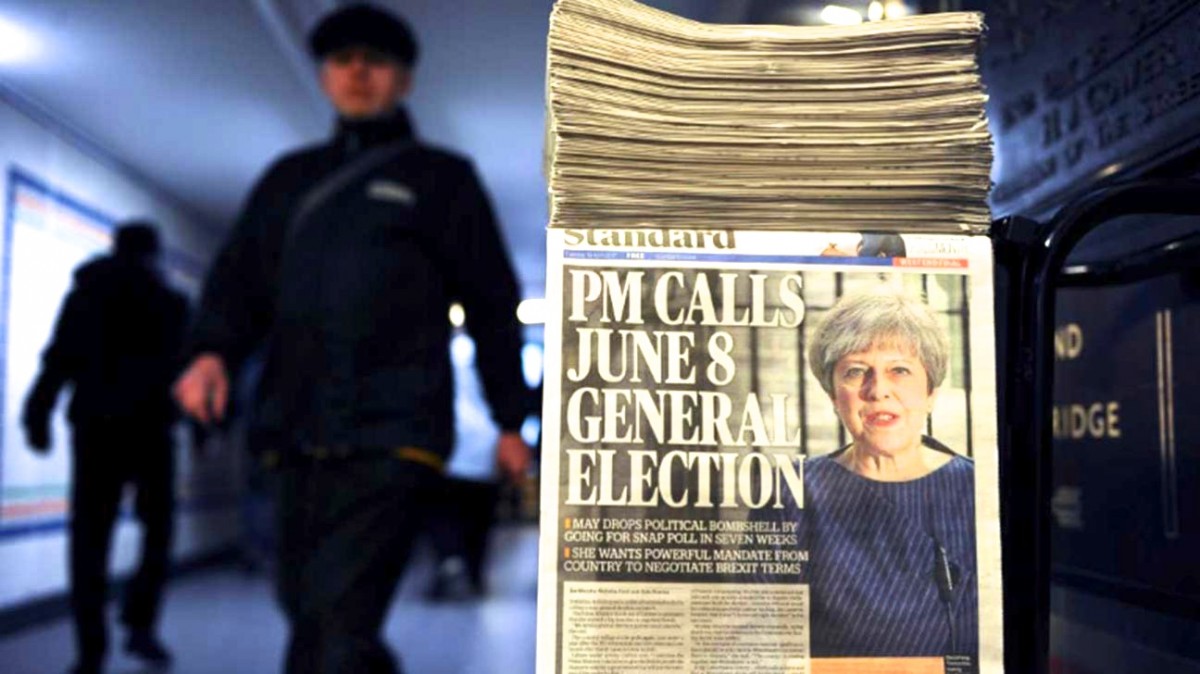
British Prime Minister Theresa May declared Tuesday that a “snap election” would be held June 8, three years ahead of schedule, shocking the nation and throwing the Brexit project into widespread question.
The announcement came just weeks after May revealed plans for an “implementation period,” during which the Brexit deal would be cemented, and raised doubts about the solidity of her plans for Britain to quickly and seamlessly leave the EU. “Last summer, after the country voted to leave the European Union, Britain needed certainty, stability and strong leadership, and since I became Prime Minister the Government has delivered precisely that,” she said Tuesday outside the prime-ministerial residence at 10 Downing Street.
“Despite predictions of immediate financial and economic danger, since the referendum we have seen consumer confidence remain high, record numbers of jobs, and economic growth that has exceeded all expectations. We have also delivered on the mandate that we were handed by the referendum result. Britain is leaving the European Union and there can be no turning back.”
For many, the shock decision signalled that the UK may be getting cold feet before it plunges headlong into isolation away from the continent.
“There has been quite a change in rhetoric around Brexit in the past few weeks,” Open Britain's co-executive director James McGrory told Occupy.com. “Cabinet ministers have been keen to point out that migrants from the rest of the EU make an enormous contribution to our economy and that we need ongoing labour from the EU to keep various sectors open. Everything from finance to hospitality to the NHS, all rely on these workers."
McGrory said the government at last "has realized that it will need at the very least a transitional arrangement where businesses and indeed the public sector can get in the people they need in the short- to long-term.” It indicates, above all, that the Brexiters simply hadn't thought the process through.
“It’s a symptom of the UK government, thinking that leaving the EU would be a lot less complex and complicated than they envisaged," he added. "The idea that they were going to get everything sorted out in two years – including a new trade deal, a new immigration system, a new customs system – is nigh on impossible in the available time frame. They’re now rowing back on their claims and it’s a welcome dose of reality.”
For Professor Anand Menon, director of UK and a Changing Europe, the abrupt decision to hold elections next month signals a delicate balancing act that May is trying to achieve as she navigates the country toward its momentous break from Europe.
“I don’t really understand the political game they’re playing here, but I understand that they’re under pressure both in terms of making sure Brexit works smoothly, but also in terms of bringing their right-wing Brexiter backbenchers on-side,” Menon told Occupy.com. "I think May is trying to navigate a course between the two. In my opinion, it would be impossible to negotiate a full-on trade deal in just two years.”
Prime Minister May’s change in the language she is using around the Brexit deal also struck Menon as significant. “Theresa May says ‘implementation’ and not ‘transmission’. That rather implies that the government thinks it can get the deal done and signed in a couple of years, but it will take a few years after that to gradually bring it into effect. I believe she’s used this new term because the Brexiters in parliament have already signalled that they’re a little bit disquieted about the possibility of transition because of the possibility that this will delay the Brexit deal – and mean it doesn’t happen as soon as they want it to happen," he said. "A lot of it is going to be about spin and language, but there needs to be some kind of substance to how they plan to bridge the departure from the EU.”
For others, the decision to hold snap elections is merely the latest sign of government disarray as the UK heads into uncharted water. “I think the whole process is still completely muddled,” said political analyst and contributing editor at Progress, Lewis Baston. “The UK government is sending different signals to different groups, seemingly making it up day by day, and there will probably be more twists and turns to this as we go on.
"The basic problem was that Brexit was a projection screen onto which people placed various hopes and fears and a lot of them are going to end up disappointed. The campaign dishonestly ended up saying what people wanted to hear.”
Baston said the Brexit project as it currently stands is untenable, and prone to unravel. “The project was sponsored basically by three incompatible ideological projects: 1) extreme free market supporters who wanted to get rid of EU regulations to create a small-state paradise in the UK, 2) the nationalism inherent in 'take back control,' a state which intervenes to regulate certainly the labour market and to some extent other bits of the economy and culture, and 3) sheer ostrich-headed nostalgia for imaginary better times.”
“The problem going forward is that people since the referendum have an emotional investment in the Brexit project and it will be difficult for them to change their minds. It will be easier – helped by the press – to find someone to blame: immigrants, EU 'bullying,' unpatriotic remainers, etc. It could be ugly.”
With left-wing UK Labour Party leader Jeremy Corbyn seen as offering an increasingly fragile opposition to the Conservatives, the mood among the left in the UK is torn. May’s government has arguably shown genuine weakness over the Brexit deal, but the question is whether or not the Labour party – the only true opposition since the disastrous performance from the Liberal Democrats during the last coalition government – can stand against the deal in the small amount of time left before Britain takes to the polls.
As left-wing candidate Jean-Luc Melenchon races up the polls in France this week, the left may be having its day in certain parts of Europe – but the UK doesn't appear to be one of them.
In her speech on Tuesday, Prime Minister May expressed her adamant belief that, despite the shock decision, the Tory government still has a future in Britain. “At this moment of enormous national significance there should be unity here in Westminster, but instead there is division,” she insisted, laying out what appeared to be an ultimatum to the people.
“The country is coming together, but Westminster is not... It will be a choice between strong and stable leadership in the national interest, with me as your Prime Minister, or weak and unstable coalition government, led by Jeremy Corbyn, propped up by the Liberal Democrats – who want to reopen the divisions of the referendum – and Nicola Sturgeon and the Scottish National Party," she said.
"Every vote for the Conservatives will make it harder for opposition politicians who want to stop me from getting the job done," May added. "Every vote for the Conservatives will make me stronger when I negotiate for Britain with the prime ministers, presidents and chancellors of the European Union.”
3 WAYS TO SHOW YOUR SUPPORT
- Log in to post comments














